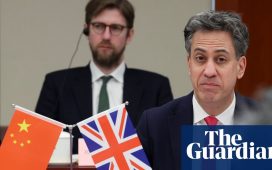Stay informed with free updates
Simply sign up to the UK energy myFT Digest — delivered directly to your inbox.
On Tuesday next week, a gaggle of barristers is due to gather in a courtroom in the middle of London for what is shaping up to be a captivating test of how the new Labour government will fight climate change.
Lawyers for Friends of the Earth and another green group will be in the High Court to argue that the Conservative government’s 2022 decision to give planning approval for the UK’s first new deep coal mine in decades was unlawful. They will face lawyers from the mine’s developers, who say their project on the west coast of Cumbria will create at least 500 direct jobs by digging up what they mysteriously call “net-zero steelmaking coal”.
Until Labour’s landslide July 4 election win, the government lawyers defending the approval decision would have been expected to appear in court too.
But now what? Is a government that campaigned promising to restore the UK’s global climate leadership and not grant new coal licences really going to spend its second full week in office effectively backing a coal mine? What about its energy secretary, Ed Miliband, who said in 2022 that if Labour ever won power it would “leave no stone unturned in seeking to prevent the opening of this climate-destroying coal mine” in Cumbria? When asked if it planned to keep defending the approval decision, the government said on Tuesday, “We don’t comment on live litigation.”
This is just one of several tests confronting a new government whose understandably cautious approach to the job of getting elected left it with a manifesto full of holes about how exactly it plans to make the UK a trailblazing “clean energy superpower”. There is no great surprise about this, considering prevailing economic and political constraints. And after so many years of green policy confusion, much will be forgiven of ministers with serious plans to shift gears.
Labour’s detail-light plans for a publicly owned company called Great British Energy that can drive investment in clean power should not cause immediate bother. Likewise its pledge to restore the phaseout date of 2030 for new petrol or diesel cars.
But its central goal of building enough green power to guarantee zero-carbon electricity by 2030 raises a series of questions. Much has been written about how this target is unachievable in a nation that got 32 per cent of its electricity from gas in 2023. This is probably the case, but it’s not the most important problem. Ambitious targets are a curse if they are so far-fetched that no one bothers trying to reach them. At a stretch, this one is possible.
Rishi Sunak’s government had the same goal for 2035 but failed to follow through. Rachel Reeves, the new chancellor, has been more decisive. On Monday she ended the nine-year-old de facto ban on onshore wind power.
That move should reassure investors that the government is serious about its plans to double onshore wind, triple solar power and quadruple offshore wind by 2030. And that it understands the planning and grid reforms needed to meet this aim. But then the question is how the government will square these efforts with its other pledges to, say, protect nature and reduce net migration?
Building loads of new wind and solar generally means building more poles and wires to get green power from where it’s generated to where it’s needed. The resulting pylon politics are already intense. Actor Ralph Fiennes and even Green party co-leader, Adrian Ramsay, one of a record four Green MPs elected last week, are among critics warning of the impact on natural landscapes. How will the government resolve this?
Then there is migration. The UK isn’t the only country switching to net zero and it’s unclear whether it will have enough home-grown skilled workers for the task. Will it let more people into the country to build wind farms?
Finally, what happens if the government does manage to build all those new renewable power plants by 2030? This new intermittent electricity will have to be integrated in a way that keeps the grid operating smoothly without power interruptions. A crunch could come just as the country faces the next general election. Imagine how net zero critics would paint the 2030 zero carbon target if voters suddenly faced power cuts.
Even if this doesn’t happen, ministers will surely face fraught climate policy problems before long. But the same goes for any government serious about shifting to a clean energy system at a pace never tried before. In an ideal world, we would know more about exactly what this government plans to do but ultimately, it’s a relief to finally have leaders willing to take the risk.











